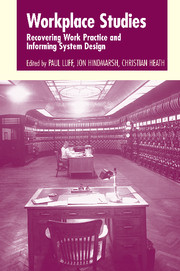Book contents
- Frontmatter
- Contents
- List of contributors
- List of figures
- Preface
- 1 Introduction
- Part 1 Exploring the workplace
- 2 Making a case: ‘knowledge’ and ‘routine’ work in document production
- 3 Design by problem-solving
- 4 Analysing cooperative work in an urban traffic control room for the design of a coordination support system
- 5 Expert systems in (inter)action: diagnosing document machine problems over the telephone
- 6 The critical role of workplace studies in CSCW
- 7 From individual action to collective activity and back: developmental work research as an interventionist methodology
- Part 2 The interface between research and design
- Bibliography
- Index
4 - Analysing cooperative work in an urban traffic control room for the design of a coordination support system
Published online by Cambridge University Press: 05 May 2010
- Frontmatter
- Contents
- List of contributors
- List of figures
- Preface
- 1 Introduction
- Part 1 Exploring the workplace
- 2 Making a case: ‘knowledge’ and ‘routine’ work in document production
- 3 Design by problem-solving
- 4 Analysing cooperative work in an urban traffic control room for the design of a coordination support system
- 5 Expert systems in (inter)action: diagnosing document machine problems over the telephone
- 6 The critical role of workplace studies in CSCW
- 7 From individual action to collective activity and back: developmental work research as an interventionist methodology
- Part 2 The interface between research and design
- Bibliography
- Index
Summary
Introduction
The investigations which we shall present here form part of a research programme whose objective is the design of computer systems in terms of support systems for users. This research programme was initiated in 1979 (after two decisive studies, one about nurses' activity, the other about human–computer interaction and data coding) by an investigation aimed at designing a system for a data collecting and coding station (Pinsky, 1979; Pinsky and Theureau, 1982). Since then, it has been developed in various work situations: offices, hospitals and other services, control of sequential and continuous industrial processes, air and urban traffic control, agriculture and fishery. Such a design involves helping the users to understand the situation and take action themselves, including the search for information, and relieving the users as much as possible (within technical and economic limitations) of the details of data supply and action, in so far as these are unnecessary for an understanding of the situation. The computer system is thus considered as an element of the support system among others, like documentation, training, organisation and other sources of information on the situation here and now.
This design approach is an alternative to the design in terms of cognitive prosthesis which emerged at the beginning of computerisation and is still dominant (see Woods and Roth, 1988, for its criticism). A computer system designed as a cognitive prosthesis is supposed to concentrate the intelligence of experts (hence the commercial name ‘expert systems’ for the most sophisticated of these systems).
- Type
- Chapter
- Information
- Workplace StudiesRecovering Work Practice and Informing System Design, pp. 68 - 91Publisher: Cambridge University PressPrint publication year: 2000
- 14
- Cited by



